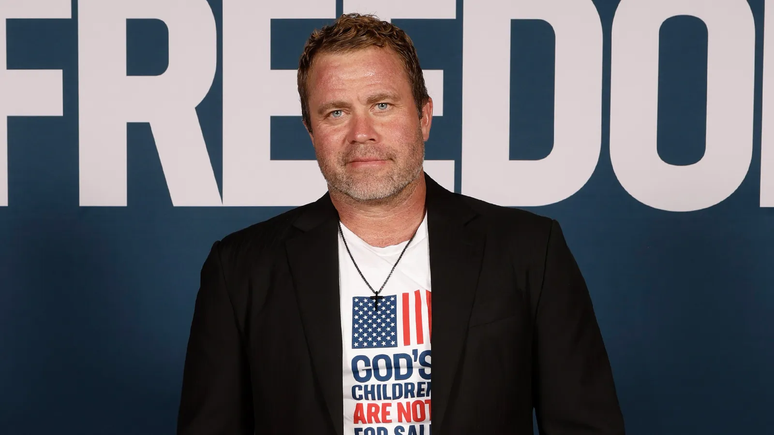The feature film was the most watched last week in Brazilian cinemas. The production has caused controversy since its release in the United States.
Since the film’s premiere, an unusual movement has been noticed in Brazilian cinemas Sound of freedom: Thousands of tickets for the feature film were distributed free of charge through various means.
Entities linked to evangelical churches and the police, the production company Brasil Paralelo and the American producer responsible for the film, Angel Studios, gave away tickets to see the film.
Groups that describe themselves as conservative, such as those linked to the Bolsonarists, have encouraged audiences to go to movie theaters to see the production, which debuted on September 21.
The massive advertising of these groups and the free distribution of tickets contributed to the film being the most watched in its first week of screening in Brazil, with more than 240 thousand spectators, according to data from ComScore.
The second most watched film in the same week, The nun 2, had 214 thousand spectators, in its third week of exposure. Published the same week as Sound of freedom, Consumables 4 it came third with 138,000 tickets sold.
Sound of freedom is based on the real-life testimonies of Tim Ballard, former US National Security Special Agent, who led the “Operation Underground Railroad” group, whose mission was to save children from a sexual exploitation ring.
In the United States, the film received promotional support from former President Donald Trump and billionaire Elon Musk, owner of Tesla.
The film is surrounded by controversy, such as criticism that it opens up conspiracy theories, which both the producer and Ballard deny (read more below).
In Brazil, evangelical clerics and Bolsonaro’s parliamentarians have defended the thesis that the film shows something that the media would like to hide.
The launch in Brazil
The movement to promote the film among groups, especially those who identify as conservative, has drawn attention on networks.
A post shared on Twitter on Friday (22/9), after publication, shows a group of evangelicals singing a religious song in a shopping mall in the interior of São Paulo as they head to the cinema to see the film.
“The church got together and shut down the whole room,” the publication manager tells BBC News Brasil.
At a preview in a cinema in Brasilia, Senator Damares Alves (Republicanos-DF) and federal deputy Mário Frias (PL-SP), both former ministers of Jair Bolsonaro (PL), spoke in favor of the film.
Among the audience were two sons of the former president, Deputy Eduardo Bolsonaro (PL-SP) and Senator Flávio Bolsonaro (PL-RJ).
“It is no coincidence that this film is being shown right now. God heard the cries of children,” Damares said during the cinema session.
“We are the resistance, the children are asking for help.”
Representative Mário Frias said the feature film is something “the mainstream media doesn’t want to talk about.”
Researcher Magali Cunha, who studies religion and politics, says there is a lot of fallout from the film on social media due to the actions of political and religious leaders with a “Christian identity in tune with far-right ideology.”
“Even evangelical news portals that have the same ideological line have had a lot of repercussions. They all highlight not only the importance of watching the film but also the conspiracy surrounding it,” says Cunha, a researcher at the Institute of Religious Studies ( ISER).
“They create the idea that the media and the political left are working against the film so that no one watches it, which is a strategy to generate curiosity and outrage in the public, especially among people aligned with the leaders who disseminate such content.”
He stresses that the fight against child trafficking should not have a “political side”. The researcher underlines that it is a “humanitarian issue that must be embraced by politicians, religious people and anyone who defends the right to life and the freedom to be”.
“It turns out that the work was produced and financed by people and organizations linked to the far right in the United States,” explains Cunha.
“This political group is known to use programs related to the defense of the family, children and youth to promote moral panic and conspiracy theories about the interests of a ‘system’ involving the political left, communism, certain names of men business, political and religious leaders interested in the destruction of families, sexual depravity and the exploitation of children and young people, including political and financial interests.”
In Brazil, Cunha points out, the distribution of the film had similar characteristics to what happened in the United States.
“All the publicity for the film in the United States was built on this basis and on the defense of heroes linked to the far right. In this publicity, these would be the only ones who would, in fact, commit to putting an end to this villain.”
The movement to publicize the film is considered unusual, but not unprecedented, says political scientist Vinícius do Valle, director of the Observatório Evangélico.
“The Universal Church has already made use of Folha Universal and its own pastors to publicize the productions linked to it”, says Valle, referring to films produced in Brazil, such as Ten Commandments.
“But something involving multiple churches, like this case now, is very difficult to happen.”
Free tickets
One of the main ways to give out free movie tickets is through the production company Angel Studios’ website. There you can buy a ticket or collect it for free.
It works, according to the Angel website, through donations from people who purchase tickets in advance to be distributed free of charge.
Paris Filmes, responsible for distribution Sound of freedom in Brazil, said in a statement to BBC News Brasil that it had no connection to the ticket donation.
“Angel Studios, the film’s international producer, is promoting the same engagement strategy here that it did abroad: People who support the film’s message can buy tickets for others who can’t, giving those other people the opportunity to watch it,” the producer said.
“We have no information on how many tickets will be distributed in this way,” Paris Filmes added.
In Brazil there were other means of distributing tickets.
Last week, for example, a group of Santa Catarina military police officers went to a shopping mall to see the film, as shown in a video shared on social media.
The National Association of Federal Police Officers also announced the distribution of 5,000 free tickets to its members and families. The organization said on its website that it made the decision “considering the global relevance and impact of the film.”
The Brasil Paralelo platform announced that it has joined forces with Angel Studios and will distribute movie tickets to those who sign up to the company’s plan.

“Those who are already subscribers to Brasil Paralelo will be able to participate in the draws to receive free tickets,” he announced.
“Faced with cancellations made to productions that defend good values, Brasil Paralelo has decided to go against the grain,” Brasil Paralelo said when announcing the distribution of tickets.
BBC News Brasil approached Brasil Paralelo for comment on the campaign to promote the film, but the producer only responded with promotional material for its partnership with Angel Studios.
The political scientist Vinícius do Valle estimates that the mobilization around the Sound of freedom indicates that there is a pent-up demand for religious cultural productions aligned with the values of groups that identify as conservative, such as those aligned with the American radical right.
“And this exports the worldview of this American right to other Brazilian conservative groups, including the Bolsonarian conservatives,” Valle tells BBC News Brasil.
The controversies of the film
Recorded in 2018, Sound of freedom it was financed by independent investors.
It has been associated by critics and pundits with the American QAnon movement – which propagates the thesis that politicians such as Donald Trump are waging a secret war against Satan-worshipping pedophiles who allegedly occupy high-ranking positions in the US government, business and and the country’s press.
These references to QAnon are not entirely unfounded, as a BBC report has shown.
The film’s star, Jim Caviezel, attended a QAnon-themed conference in 2021 and appeared several times on Steve Bannon’s podcast, who recently said QAnon is “a good thing.”
As another recent BBC report showed, the idea shown in the film that there is a global network of child traffickers lurking everywhere is one of the central thoughts of QAnon.
QAnon expert, writer Mike Rothschild, told the BBC that anti-trafficking groups have already pointed out that this conspiracy theory hinders their efforts to fight this type of crime.
“The film revolves around the unfounded panic that large trafficking groups wait to capture American children,” Rothschild said.
“Trafficking is real, but films like this obscure the real problem. The film is marketed to QAnon believers in the same way that QAnon works through fear of trafficking and by appealing to the emotions.”
The film’s producer denies harboring conspiratorial thoughts.
“Anyone who has seen this movie knows that it has nothing to do with conspiracy theories,” said Angel Studios president Jordan Harmon. “It’s about a man who did something brave.”
Tim Ballard, who inspired the film, responded to Fox News that those who cite conspiracy theories when talking about the film “make no connection to the true story.”
“It tells a story based on truth… I think the left, this media, doesn’t want the debate that this film will generate,” he added.
Source: Terra
Rose James is a Gossipify movie and series reviewer known for her in-depth analysis and unique perspective on the latest releases. With a background in film studies, she provides engaging and informative reviews, and keeps readers up to date with industry trends and emerging talents.







